FINDING YOUR TRIBE
Theatre of Identity, aka Social Issues Theatre, is a fascinating phenomenon: this genre promotes a particular people’s cultural identity and invites members of that culture and other cultures to experience that culture’s joys, problems, history, traditions, and point of view. Plays like Torch Song Trilogy, The Boys Next Door, and Yellow Face were written to shed light on minority issues that had previously been given short shrift by the American Theatre. Tribes, which opened at the Mark Taper Forum this week, sheds light on the issues facing deaf people, and even though the play unfortunately falls apart in the second act, the strong ensemble effortlessly distracts from the shortcomings of the play’s dramaturgy.
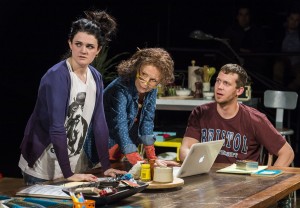 Tribes is the story of deaf Billy (Russell Harvard) who was born into a “creative” yet insular hearing family. When Billy meets the comely Sylvia (Susan Pourfar), who is slowly going deaf, his own life turns upside down, and he explores the non-hearing tribe beyond his hearing family. One of the play’s flaws is that Billy’s choice, to stay with his family or live in the deaf world, is presented as an either/or situation, when in reality, there is no reason he can’t assimilate within both tribes. To further undermine her story, playwright Nina Raine has crafted Billy as a less than dynamic main character while his lively, artsy, crazy family – loving him as best they can – spins out of control around him. It’s never quite clear what Billy wants, especially as he pursues Sylvia, a woman who already has a boyfriend.
Tribes is the story of deaf Billy (Russell Harvard) who was born into a “creative” yet insular hearing family. When Billy meets the comely Sylvia (Susan Pourfar), who is slowly going deaf, his own life turns upside down, and he explores the non-hearing tribe beyond his hearing family. One of the play’s flaws is that Billy’s choice, to stay with his family or live in the deaf world, is presented as an either/or situation, when in reality, there is no reason he can’t assimilate within both tribes. To further undermine her story, playwright Nina Raine has crafted Billy as a less than dynamic main character while his lively, artsy, crazy family – loving him as best they can – spins out of control around him. It’s never quite clear what Billy wants, especially as he pursues Sylvia, a woman who already has a boyfriend.
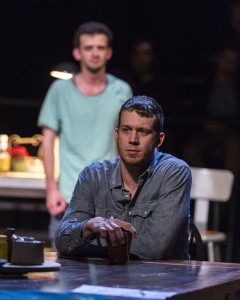 On the surface, the play is about communication, sibling rivalry, belonging, and other family-related issues. At its core, however, Tribes is Billy’s coming-of-age story; it is inevitable that Billy finally stands up for himself to cut the apron strings in order to grow up. But logic takes a back seat to ideas, and Act Two takes a few too many wrong turns culminating in a poorly executed storyline involving Billy’s dishonesty at a new job. Diverting as Tribes may be, there’s ultimately a sense that the play could be the first episode of a new series about a nutty British family who must contend with modern day issues: a deaf son, a mentally-challenged son, the misunderstood daughter, adult children who still live at home, etc. With deafness as its main subject, the element that prevents Tribes from being reduced to a theatrical afterschool special – aside from an abundance of profanity – is Raine’s well-articulated ideas about who gets to decide how the deaf community should communicate, either by lip-reading or sign language.
On the surface, the play is about communication, sibling rivalry, belonging, and other family-related issues. At its core, however, Tribes is Billy’s coming-of-age story; it is inevitable that Billy finally stands up for himself to cut the apron strings in order to grow up. But logic takes a back seat to ideas, and Act Two takes a few too many wrong turns culminating in a poorly executed storyline involving Billy’s dishonesty at a new job. Diverting as Tribes may be, there’s ultimately a sense that the play could be the first episode of a new series about a nutty British family who must contend with modern day issues: a deaf son, a mentally-challenged son, the misunderstood daughter, adult children who still live at home, etc. With deafness as its main subject, the element that prevents Tribes from being reduced to a theatrical afterschool special – aside from an abundance of profanity – is Raine’s well-articulated ideas about who gets to decide how the deaf community should communicate, either by lip-reading or sign language.
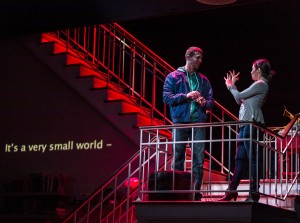 The most satisfying element of David Cromer’s (Our Town) production is the top-notch acting. Jeff Still’s opinioned, narcissistic patriarch is all bluster and passion while he defends anything related to the intellect. As the story unfolds, we see his life choices as more of a defense against a very difficult family dynamic that he has no control over. Lee Roy Rogers plays Beth, the reasonable, kind-hearted matriarch of the family; she is the play’s moral and emotional compass, reminding everyone under her roof of the need for empathy. Will Brill has the showiest role as the mentally ill brother, and he makes the most of Raine’s overwrought writing while actively maintaining the ensemble’s balance. Gayle Rankin rounds out the hearing tribe with a solid, enjoyable performance as Ruth, the sister who has yet to live up to her potential, even as her role adds little to the play’s trajectory.
The most satisfying element of David Cromer’s (Our Town) production is the top-notch acting. Jeff Still’s opinioned, narcissistic patriarch is all bluster and passion while he defends anything related to the intellect. As the story unfolds, we see his life choices as more of a defense against a very difficult family dynamic that he has no control over. Lee Roy Rogers plays Beth, the reasonable, kind-hearted matriarch of the family; she is the play’s moral and emotional compass, reminding everyone under her roof of the need for empathy. Will Brill has the showiest role as the mentally ill brother, and he makes the most of Raine’s overwrought writing while actively maintaining the ensemble’s balance. Gayle Rankin rounds out the hearing tribe with a solid, enjoyable performance as Ruth, the sister who has yet to live up to her potential, even as her role adds little to the play’s trajectory.
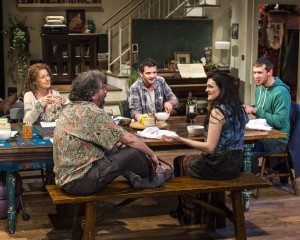 Deaf actor Russell Harvard’s Billy is most compelling when he connects with his rage and confronts his family in Act Two. His speaking ability is no match for his signing passion, but Cromer and Projection Designer Jeff Sugg remedy Harvard’s inarticulate line readings with elegantly placed projected titles. Susan Pourfar has a lovely naturalistic quality, but her Sylvia is reduced to being a literal mouthpiece for Billy, although she has one intensely brilliant moment at the end of Act One that galvanizes the play and lets the audience see exactly why Billy is so compelled by her. The nuanced acting of this top-notch ensemble – especially evident when the family meets the new love interest – elevates this production above the script’s predictable tropes.
Deaf actor Russell Harvard’s Billy is most compelling when he connects with his rage and confronts his family in Act Two. His speaking ability is no match for his signing passion, but Cromer and Projection Designer Jeff Sugg remedy Harvard’s inarticulate line readings with elegantly placed projected titles. Susan Pourfar has a lovely naturalistic quality, but her Sylvia is reduced to being a literal mouthpiece for Billy, although she has one intensely brilliant moment at the end of Act One that galvanizes the play and lets the audience see exactly why Billy is so compelled by her. The nuanced acting of this top-notch ensemble – especially evident when the family meets the new love interest – elevates this production above the script’s predictable tropes.
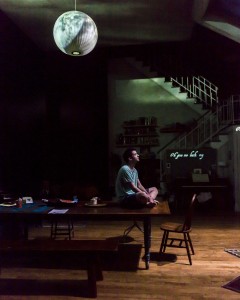 The design team also makes some strong choices, if not always used to full effect, which creates a much-needed intimacy. Cromer and Scenic Designer Scott Pask (The Book of Mormon) have re-configured the Taper, adding some seats to enlarge the thrust of the stage. The warmly designed great room – a set filled with well-observed details – provides ample playing space for all the nuanced nooks and crannies of the family’s house. It is when the play’s action leaves the home that the design goes wanting. A mattress on the dining room table and a party scene played on two long flights of stairs upstage come off as a bit awkward and less important than they actually are. Keith Parham’s lights are beautifully realistic, but several late night scenes are lit so dimly as to obscure actors when the play may have been better served were they more illuminated. Daniel Kluger’s sound design never rises above the incidental, especially given the inconsistent volume and occasional muddy dialects from the actors. For a play about language and hearing, it’s a tad ironic that certain patrons – depending on where they sat – had sound issues (as acting becomes more cinematic, houses such as the Taper are bound to individually mike actors if all of the dialogue is to be heard).
The design team also makes some strong choices, if not always used to full effect, which creates a much-needed intimacy. Cromer and Scenic Designer Scott Pask (The Book of Mormon) have re-configured the Taper, adding some seats to enlarge the thrust of the stage. The warmly designed great room – a set filled with well-observed details – provides ample playing space for all the nuanced nooks and crannies of the family’s house. It is when the play’s action leaves the home that the design goes wanting. A mattress on the dining room table and a party scene played on two long flights of stairs upstage come off as a bit awkward and less important than they actually are. Keith Parham’s lights are beautifully realistic, but several late night scenes are lit so dimly as to obscure actors when the play may have been better served were they more illuminated. Daniel Kluger’s sound design never rises above the incidental, especially given the inconsistent volume and occasional muddy dialects from the actors. For a play about language and hearing, it’s a tad ironic that certain patrons – depending on where they sat – had sound issues (as acting becomes more cinematic, houses such as the Taper are bound to individually mike actors if all of the dialogue is to be heard).
The conversation Tribes inspires about communication and community in the deaf world more than justifies this production. It’s unfortunate that Raine has written a play where issues and ideas take precedence over storytelling, but seeing a terrific ensemble at work in a socially relevant world is reason enough to overlook the short-comings in the writing.
photos by Craig Schwartz
Tribes
Center Theatre Group at Mark Taper Forum
scheduled to end on April 14, 2013
for tickets, call 213.628.2772 or visit http://www.CenterTheatreGroup.org
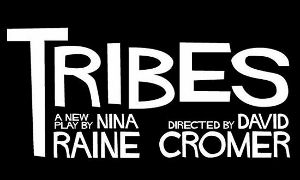
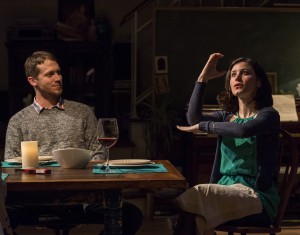
{ 2 comments… read them below or add one }
In a play about language and communication it would’ve been nice to hear all the dialogue. I wasn’t the only one asking “What did he/she say”? I had very good seats and lost about 40% of what was being said.
I don’t think the play was about the deaf. The debates of sign vs. lip reading, whether sign language is an inferior mode of expression, is deafness a “disabilityâ€, was over decades ago. The Deaf won. It is anachronistic that a highly educated family today could be as stupid as the family in Tribes. Rather, the play was about the ambiguity of identities and how meaning is attached to language. Each of the characters strives for a self-defining identity while uneasily straddling several. Billy is caught between his denial of deafness and his newfound Deaf identity, Sylvia is in-between the hearing world and Deaf world. Ruth is bound to her family and her pipe dream of being an opera star. Daniel is divided by his desire to be independent from his family and wanting desperately to be dependent upon his brother. These multiple, ambiguous identities are never resolved, nor can they be. But, when Daniel loses his ability to speak he is able to express his need to connect through sign – better than he could have done with words. That need for connection, however tribal, is universal.
Tribes is indeed an issue driven play – but worth the effort.